World War I[]
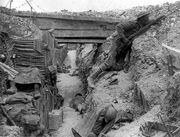
French soldiers in the Western Front
The devastating conflict of World War I began in 1913 with the escalating crisis in the Balkans between Austria-Hungary and the Ottoman Empire, which would soon result in the entire world going to war as the chains of alliances were activated across the globe. The Allied Coalition and the London Pact would fight it out for four years until 1917, with battlefields ranging from northern France to Mississippi to colonies in the Pacific. The official Austro-Hungarian surrender on October 14 would signify the end of the war, but not before 11 million men had been killed and entire regions devastated.
Trench warfare would dominate the battle front, with millions of men being maimed for little ground, as artillery constantly thundered. The war led to the creation of new weapons like the tank, poison gas and the airplane, while weapons like machine guns and modern battleships were improved upon. While their role was somewhat limited, it was ensured that these weapons would be widely used in future wars.
Victory and Defeat[]

The alliances of the war. Yellow was the London Pact, green was the Allied Coalition, and grey were the neutral nations
The London Pact had achieved victory in Europe. France realized that it would be difficult to stop a German offensive in its territory, resulting in the French attempting to quickly knock out Germany at the start of the war. This plan failed, and millions of men were killed on the Western Front in the next four years. Between Britain's most powerful navy and Germany's most powerful army, France was trapped in a tough position. The Germans also put up a strong defensive effort against the Russians in the east, and the war eventually resulted in the Russian Empire collapsing into civil war between democratic and Communist factions. Germany could now bring in its entire manpower to the Western Front, and the London Pact's armies finally blew through France's vast network of trenches. Paris fell in early 1919, and the pressure was now on Austria-Hungary. The years of ethnic tension finally exploded in the empire, which collapsed and surrendered in the fall of 1919.
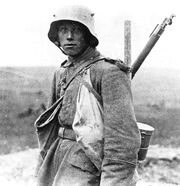
German soldier in 1916 on the Western Front
In North America, the Confederate States were unable to rely on foreign support like had been done in previous wars, resulting in the United States finally having the advantage. With their vast industrial might and manpower, the United States outgunned, outproduced, and outnumbered the Confederacy. Fierce fighting along the eastern seaboard featured trench warfare, though eventually the United States broke through and captured Richmond, forcing the Confederate surrender. At this point, the war in Europe was winding down, and the London Pact was in no position to cross the ocean and liberate the Confederacy.
Aftermath[]
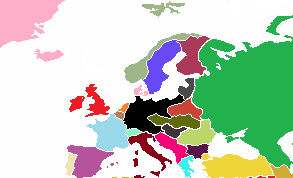
Europe following the war
The war resulted in a major redrawing of the world's map. Old empires, like Austria-Hungary and the Ottoman Empire were dismantled into several new countries. Germany was perhaps the biggest winner, creating several new small allied nations in the collapsed Austria-Hungary, with Austria being added to the Empire itself. Several nations were formed in the east from the collapsed Russian Empire to serve as buffer states, such as Livonia and Second Polish Republic. France's colonies were handed over to Germany and the army and navy were restricted, while the losing nations were forced to pay huge amounts of war reparations to the victors. Massive debt and unemployment gripped the losers of the war, as various parties sprang up promising to "reclaim the country".
Much to the anger of the Confederacy, the United States was not punished in the Treaty of Versailles. Its gains in Oregon were given up, but America was given the coastline it had taken from the Californian Republic. America had to pay some war reparations, but the Confederates demanded more. Future Confederate leader Hugo Black declared, "The London Pact has stabbed us in the back. Were we not members of the same alliance?" Movements across the losing nations promised to change things for the better and gain revenge for the losses, but these movements were rarely listened to, for fear of another war breaking out. An entire generation had been devastated by the war, and a total of around 43 million citizens would lose their lives. Adding to this was the outbreak of the Spanish Flu, which wrapped around the globe in 1918 and infected around 500 million people and led to the deaths of between 50 and 100 million. Fortunately, the flu disappeared during the winter, but troubles were far from over.
Foundation of the United Nations[]

The world following the Great War
Hoping to end the horror of warfare, the United Nations was created in 1919 and based in Berlin. It was the world's first international organization designed to end conflict and promote world peace through disarmament and settling disputes through negotiations and arbitration. The organization hoped to include every nation, however, the United States refused to join as President Thomas R. Marshall admitted he didn't particularly have an opinion about joining such an organization, and the isolationist movement in Congress successfully blocked any US attempt to join it. Isolationists believed the United States shouldn't be dragged into any European conflict, and instead only focus on the Americas and the conflicts and disputes there.
Without one of the more powerful nations in the world, the United Nations was already off to a bad start. What's more is that the United Nations did not have any sort of army for itself, instead relying on the militaries of the Great Powers to enforce treaties and acts. However, their militaries were exhausted, and Britain and Germany, the two main proponents of the United Nations, had no desire to join any future conflicts.
Extremism in France[]

The flag of Lyonism
France was soundly defeated in World War I by the United Kingdom and Germany. The humiliation of seeing the German flag hoisted above Paris would haunt the French during the next decades. Northern France had been utterly destroyed by the fierce fighting of the Western Front. and war reparations sent the new French Republic into a spiraling depression. The Spanish Flu wrapped devastated France, with thousands becoming victims. Old issues arose as well, such as workers' rights and the deplorable living conditions most the lower classes endured. French citizens were angered at economic stagnation and the current administration's failed handling of war.
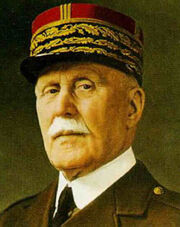
Philippe Petain
This anger resulted in Philippe Pétain, a brilliant general during the war, to propose a new form of government: Devoirism, named for the French word for "duty". Pétain proposed that the only way to prevent future conflicts and protect French citizens was to serve to state to the best of a citizen's ability, which would lead to France crushing its enemies and establishing an area of safety for its citizens. Pétain would die in 1921 from Spanish Flu before he could announce a successor, which became a competition between naval captain Francois Darlan and politician Pierre Laval. During the early 1920s much of the Republic would become a lawless area controlled by paramilitaries. After exteme hyperinflation during 1920-1922, new president Gastom Doumergue issued in a new debt restructuring plan and return some stability to the economy. but it was too late. Darlan would lead the 1922 March on Paris, forcing Doumergue to resign and Darlan declared himself the new President of France.
Russian Civil War[]
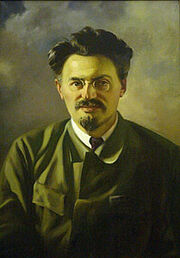
Prime Minister Leon Trotsky
With the German armies advancing into Russian territory, anger at the monarchy and the want for change eventually led to Czar Nicholas's abdication of his throne in 1918. The new Provisional Republic of Russia ruled over an unstable nation, along with the Communist Red Army being formed by Vladimir Lenin, Joseph Stalin and Leon Trotsky. The October Revolution began the civil war between the Communist Bolsheviks and a loose coalition of anti-Communist forces known as the White Army. Foreign support was given to the White Army by the majority of democratic nations, but the Red Army scored a series of victories in Ukraine and soon gained the upper hand. However, Lenin was assassinated in late 1919 by "green army" anarchists, and the rivalry for leadership between Stalin and Trotsky resulted in Trotsky leaving to form his own faction. As the White Army collapsed, Trotsky's forces, which western newspapers referred to as the "Scarlet" Army, stepped in to fill the gap.
Stalin ruled with an iron grip over the Red Army, killing anyone who was suspected of opposing him or supporting Trotsky, driving many possible supporters from him. The Scarlet Army, aided by a coalition of green armies and limited foreign support, defeated the Red Army in Crimea, capturing Stalin himself. The Red Army disbanded shortly after and Trotsky took up residence in the Kremlin as the first Prime Minister of the Greater Union.
Roaring Twenties[]
The 1920s meant a period of major economy prosperity for the winners of the war, and to a lesser extent the losers. As United States Charles Evans Hughes put it, it was a "return to normalcy" following the patriotism and emotions of the first world war. Products were cheaper and could now be afforded by a new level of working class. This class possessed extra cash and a desire to buy, which led to a huge number in sales for new devices like the radio, telephone and the automobile, which could only be purchased by the wealthy before. Jazz music and Art Deco rose in popularity, and there were significant changes to society and lifestyle. President Hughes' successor, Nicholas Murray Butler, presided over one of the nation's greatest times of prosperity, with prices dropping and production booming.
New Generation[]
As the decade continued the horrors of the war and "The Lost Generation" were forgotten. Industry expanded as new highways and expressways were paved for automobiles. The electric grid was expanded, powering millions of homes, and the movement from rural to urban, as the great cities like Paris and New York were filled with skyscrapers and towers. The role of women increased, as many more were employed and rejected the view society demands for them. Suffrage was granted for most women across the world. The increasing demand for consumer goods led to the rise of radios, telephones, and the chemical industry. The movie industry also boomed, as new classics, such as The Confederate Way, released in 1924, resulted in waves of nationalism and good feelings for other citizens.
Radios linked nations and led to the create of "media culture" which was had dominated western nations even to this day. Advertisements, programs, and news brought information and entertainment to the citizens of each nation. The public also began to focus on celebrities and sports stars, such as Babe Ruth in the United States. Sports expanded across the globe, which led to a renewed interest in the Olympics and the creation of the FIFA World Cup, which held its inaugural tournament in 1930 and was won by a talented Uruguayan team.
Spread of Devoirism[]

Italian dictator Benito Mussolini
The 1920s also lead to the rise of extremist groups in the defeated nations. Following the French, the next which came to power was Benito Mussolini and his Partito Nazionale Devoirista, the National Devoirist Party, following a coup in 1924 that resulted in Mussolini being named Prime Minister. Using the teachings of Petain, Mussolini fully embraced devoirism. He led a centralized government that took ownership of many of the country's businesses and shops. He outlawed other political parties, sending those who disagreed with him to remote camps. He took control of the press, which now displayed propaganda. Mussolini's dictatorship was met withcheers because he promised a "New Roman Empire" and the failures of previous governments would not be repeated.
The other nation hit hardest by the war was the Confederacy. Newly elected President Bibb Graves found himself in a difficult position, with Communist and conservative factions attempting to take power, often in bloody marches with paramilitaries. The crippled Confederate military put down these factions, and Graves used tariffs and loans to fix, or at least hide, the hyperinflation and the unstable Confederate economy. Despite some stability that was created under the presidency of Henry L. Whitfield, the anger at the "Great Betrayal" by the London Pact, the desire for revenge on the United States, and extreme nationalism never disappeared. Hugo Black, a veteran in the First World War, was a founding member of the "Army of Virginia", named after Robert E. Lee's heroic army during the Confederate War of Independence. Black quickly rose through the ranks of the party, and soon became its leader. Black blamed the generals and leaders during the world war that had gained their position based on their name, not on their merit, for the Confederate defeat, as well as blacks that had risen up in rebellion as the war drew to a close. Black's ideas began to catch on, but once some economic stability was achieved, support for his party waned. In 1928, party members would assassinate President Whitfield, and Black was arrested and thrown in jail. After ten months he was released, and his resolve to restore the Confederacy to its former glory was stronger than ever.
The Great Depression[]
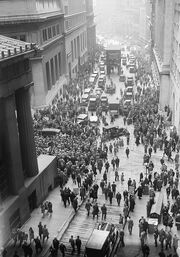
The crowd that gathered around the New York Stock Exchange in 1930
The prosperity of the Roaring Twenties would come to an end with the Stock Market Crash of 1930. The prices of the United States and French stock markets began to fall a few days before, but on September 2, 1930 the stock market finally crashed, leading to the Great Depression. With the American, British, and German economies collapsing, the rest of the world's economy took a severe downturn as well. The depression affected countries both rich and poor, developed and undeveloped. Jobs were lost and millionaires lost all of their money in just a few days. Income, taxes and prices fell as unemployment soared, reaching 27% in Germany and 25% in the United States. Industry and constructed ground to a halt, while agriculture, suffering from the terrible Dust Bowl, had the price of its crops fall by nearly 60%. One of the few countries that avoided the worst of the Great Depression was France and Italy, thanks to massive public works such as the draining of marshes, highway construction, hydroelectric expansion, building of railways, and rearming the military.
The New North and South[]
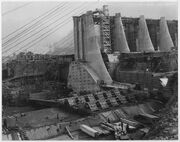
Massive infrastructure programs, like the building of Fontana Dam in North Carolina, helped revive the United States' economy
The Depression took America by storm, ending the shining 1920s. Nationalist President Herbert Hoover would be unable to handle the crisis effectively, and by 1931 unemployment was at 25%, factories shut down, and the country was in dire straits. The Liberal Party was able to elect Samuel DeWitt in 1932, who would immediately set out to rebuild the economy. The Liberals created welfare programs, new regulations, development of new urban areas, social security, new trade unions, and promoted the settlement and building of infrastructure in the newly acquired Oregon Territory. Aided by Secretary of Interior Franklin D. Roosevelt, these programs were implemented across the nation, with successful results. The main goal of providing the "3 Rs" of relief, recovery and reform had brought the country's economy back from the depths of 1930.
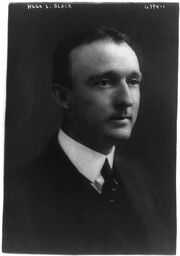
Confederate President Hugo Black
With the onset of the Great Depression, Black returned to the national forefront. The economy was devastated and millions were unemployed and desired to change the current system. Black promised change and a return to greatness, resulting in the ranks of the Army of Virginia growing tremendously. The election of 1936 would give Black the victory over Dennis Murphee, and he would become president. He would consolidate power by increasing the power of the president and his cabinet over the Confederate Congress, and those who opposed Black found themselves arrested and thrown into prison camps in the Arizona desert or rural Texas. Black's government took control of the major business and corporations, and set Confederate citizens to work by industrializing the Confederacy, the lack of which Black blamed as another reason the Confederates lost the Great War. Heavy military spending was also used, with the Confederate military modernizing itself with advanced weaponry, with Black ignoring the limits placed on the Confederate military by the Treaty of Portsmouth.
In California, war veteran James Scrugham was elected in the 1931 election on a devoirist platform, promising to turn the country around. Following Black's ascension to power in 1936, Scrugham and Black met, promising to aid each in the upcoming struggles to come.
Rise of Extremism[]

Francois Darlan making a speech in Paris, 1935
The defeated nations of the world were the ones affected the most. Already hard pressed to repay war debts, the defeated nations became heavily reliant on foreign loans, but with the economic downturn neither side could afford to pay the debts or loans that sent the global economy into a continuing downspin. The devoirist nations of the world, such as France and Italy, used the decline of the world's economy to blame "enemies of the state" including unitarians, communists, anarchists, and increasingly discriminated against minority groups, such as Jews and Gypsies. Over the decade thousands were arrested for suspected disloyalty and thrown in camps. The government took tighter control of the radio and newspaper, with Darlan spreading propaganda by hosting a monthly radio show. Darlan ordered the building of new factories and mines to support the army against France's enemies. Darlan's old rival, Pierre Laval, was becoming a liability for the devoirist government because he still controlled a large paramilitary that wasn't loyal to Darlan, resulting in Laval being captured and executed by de Gaulle's secret police after being accused of plotting against the state. During the Nuit de Feu hundreds of Laval's supporters and Darlan's critics were killed or captured. Darlan's main political opponent no longer existed, and Darlan finally had total control over France.
The defeated nations of South America had been particularly hit hard as well; following decades of economic and neo-colonialism, the defeated countries were suddenly cut off from their connections with Europe. The United States and Europe had been supplying loans to the nations of Colombia, Argentina, Chile, and Bolivia as well, and with the Great Depression no more loans and investments were being made in South America. Devoirism continued it's spread across the globe, starting with Argentina, which elected Nimio de Anquin, the leader of the Argentine devoirist party, in 1932. Anquin's election and Argetina's subsequent policies to turn around the economy caused a domino effect as the other defeated nations would elect their own devoirist leaders of devoirist generals would rise to power in coups.
Uncertain Peace[]
With the Great Depression wrapping around the globe, the victors of the First World War only took care of themselves and ignored of the other problems that other nations suffered from. This was prevalent in China, which was under the government of Chiang Kai-shek and the Kuomintang (KMT). In 1911 the Qing Dynasty that ruled China had collapsed, leaving most of China in the hands of warlords. Sun Yat-sen, the leader of the anti-monarchist and pro-unification KMT, approached foreign powers. However, he would not see these in his lifetime, as he would die in 1925. China was nearly split between the KMT and newly-formed Communist Party of China, led by Mao Zedong. Neither side could gain the upper hand, as they continued to clash across the large nation.
Japanese Expansion[]
With China focused on the civil war between Communists and Nationalists tearing the nation apart, the Japanese saw an excellent opportunity to expand. With China conquered, Japan would have a never ending supply of raw materials and new markets for its manufactured goods. The Mukden Incident in 1931 led to the Japanese invasion of Manchuria and the establishment of the puppet state of Manchukuo. Too weak to challenge Japan, Chiang turned to the United Nations for help, but no nation would. The Japanese would continue to make advances into China until 1937, when the Japanese attacked Beijing and total war began between the two nations.
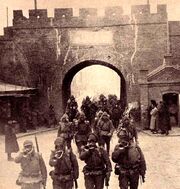
Japanese troops entering Manchuria
The Japanese began a full scale invasion, starting with the Battle of Shanghai. After three months of heavy fighting, the major city fell, and the Japanese would later take Northern Shanxi and Nanking. The Communists and Nationalists were forced to come to a nominal truce, in order to focus on forcing out the foreign invaders of their land. After a fierce battle Japan captured the city of Wuhan, forcing the government to retreat to Chongqing. Despite his losses, Chiang refused a ceasefire and continued the fighting.
Mexican Civil War[]
The Mexican Empire, which had remained an ally of France since the 1860s, had lost its footing without French support. Much of northern Mexico had been destroyed in the earlier revolution and World War I, and hadn't been rebuilt. With the Great Depression, the Mexicans there lived in ruins with homes and shops in poverty. While the Partido Devoirista (Devoirist Party), known at the Nationalists, led by Gustavo Sáenz de Sicilia, was founded in the cities, in the north the Sonora Movement, led by Vicente Lombardo Toledano, grew and gained support from the poor northern workers, later growing and combining with other democratic and socialist parties in a coalition referred to as the Liberals. Toledano's movement had a democratic and socialist edge to it, which resulted in tension with the Nationalists. The citizens of Mexico City, led by the Nationalists, stormed government offices on April 6, 1937, executing Emperor Albert II and the monarchy was disbanded. The Nationalists attempted to gain control over Mexico, but the Liberals refused to bow to them, with Toledano demanding the destruction of the current government and replaced by one made of the workers and the common people.
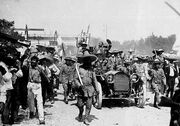
Devoirist leaders marching into Cuernavaca
The world took more interest in the bloodshed in Mexico than it did in China. The devoirist nations of the world began sending rifles, machine guns, artillery, aircraft, and tanks to Sáenz, especially the Confederacy, which infamously destroyed the city of Hermosillo in a bombing run by its air force. The GUSR, hoping to support the democratic and left-leaning Liberals sent support of their own. Fierce fighting continued into 1938, but by now the factories and industries of Mexico City and other Nationalist territories had given them the advantage. The Liberals had little industry of their own, resulting in a series of defeats as the Nationalists could reinforce and re-equip their armies faster. By the time World War II began in Europe, Toledano had been captured and executed, and the devoirists took control of the country.
Path to War[]
In the second half of the 1930s, the world's nations began on a path to an even more devastating war. The devoirists were now in power, and growing bolder once it appeared that the London Pact did not want to fight another conflict.

North America in 1937
In North America, the Confederates sent a squadron of bombers and leveled several northern Mexican cities. Following this show of force, President Black demanded that Oklahoma be returned to the Confederacy in 1939. US President Samuel DeWitt, against the judgment of his advisers, especially Secretary of the Interior Franklin Roosevelt, caved to Confederate demands and agreed to hold a referendum in Oklahoma. An overwhelming majority at the polls agreed for re-unification, with white supremacist thugs threatened those who planned to vote against the re-unification. They also prevented blacks, who were guaranteed a vote by President DeWitt, from voting. With popular opinion supporting re-unification, DeWitt agreed to return the state to the Confederacy in 1939 in exchange for the demilitarization of the state for the next 20 years.
Thousands of blacks fled north to escape the advancing Army of Virginia. On February 1, 1940, there were celebrations across Oklahoma as the state was re-added to the Confederacy. Tensions between the Confederacy and the Union seemed to ease up, until two months later when Black broke his promise and sent troops, tanks, and airplanes to Oklahoma. DeWitt had been tricked, and the Americans vowed to never let that happen. The Americans notice increased Confederate troop activity across the border during 1940, and Black demanded another referendum be held in West Virginia. Up north, Franklin Roosevelt had been elected in 1940, and the new president declared that no more referendums will be held, and there will be punishment for not following the guidelines set by the Treaty of Portsmouth and for remilitarizing Oklahoma. With Black and his generals realizing the Union wouldn't give up any more land peacefully, they finalized the finer points of Operation Lee: the massive invasion of the United States.
Aggression and Expansion[]
In direct violation of the Treaty of Versailles, the French remilitarized the Champagne region, right next to the German border. Darlan also introduced conscription and rearmament, and the French military grew rapidly. Darlan ignored the restrictions placed upon France's military by the Treaty of Versailles, and soon France's military was one of the largest, most advanced, and well-funded militaries in Europe.
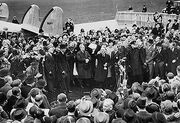
British Prime Minister Neville Chamberlain declaring "Peace in our time" following the Lyon Conference
The United Nations was struggling to end the violence. Following its condemnation of Japan, the Japanese simply left the organization, with the United Nations powerless to do anything about it. Benito Mussolini, eager to begin building a new Italian empire, ordered the invasion of Ethiopia in 1935. Despite the violation of the organization's charter, and Ethiopia's request for aid, the United Nations did little. After seven months of fighting, Ethiopia was under Italian military occupation, and incorporated into the larger Italian East Africa colony. The successful war brought widespread acclaim for Mussolini and devoirism, and led Darlan to believe he could go even farther.
Algeria, formerly France's closest colony, had been forcibly given independence following World War I. Darlan claimed that the French citizens there were living under the oppressive authority of the new Muslim leaders, and prepared his military for a war of liberation in 1937. The leaders of Britain and Germany met with Darlan and Mussolini in the French city of Lyon. In the Lyon Confederence, they agreed to allow the French to retake Algeria, in exchange for no further territorial expansion from either France or Italy. De Gaulle agreed, but the lack of input from Algeria resulted in the Algerian government refusing to come under French rule. In a spectacular show of force, the French launched a massive aerial and land campaign, taking over Algeria in a matter of weeks. New, powerful French bombers killed Muslim leaders in bombing raids, and French tanks barreled through Algerian defenses. Britain and Germany realized how strong France had become, and realized that they needed to begin to rearm and modernize their own armies. Three months later, Italy would violate the treaty by invading Greece. The citizens of Europe had realized too, that another bloody war was on the horizon.
Boîtier Blanc[]

French troops invading Belgium
In August 1940, the British and Germans noticed an increased level of French troop movement near the Belgian border. Also alarming was the signing of a non-aggression pact between France and Russia, which had a secret agreement that they would split Germany, with Russia gaining Germany's Polish territory. Germany found itself potentially facing a war on two fronts, and when it noticed an increased movement of French troops near the Belgian border, it demanded France stand down. Francois Darlan announced that if Belgium did not surrender itself to France by September 20, there would be war. De Gaulle did not think Britain and Germany would come to Belgium's aid, however the two powers announced they would protect Belgian independence. Belgium also refused to surrender, and both sides began to mobilize for war. On the early morning of September 13, a week earlier than expected, French troops staged a false flag attack by Belgian soldiers. Claiming that Belgium had attempted to sabotage key French targets, French tanks and troops rolled over the border and into Belgium as part of "Case White" or "Boîtier Blanc". Britain and Germany would declare war on France, launching World War II.
| |||||||||||||

